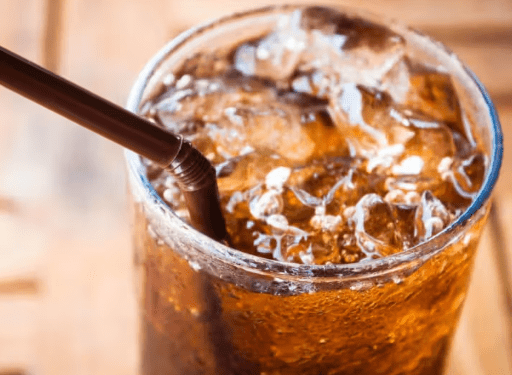Diet soda is often seen as a healthier alternative to sugary drinks. With zero calories and no sugar, many people drink it daily. However, a common question remains: Is diet soda bad for your teeth?
This article explores how diet soda affects dental health. You’ll learn what’s inside diet soda, how it reacts with your teeth, and what you can do to protect your smile.
What’s Inside Diet Soda?
Main ingredients include:
- Carbonated water
- Artificial sweeteners (like aspartame or sucralose)
- Citric acid or phosphoric acid
- Caffeine (in some varieties)
- Artificial flavors and colors
These ingredients give diet soda its taste. But they also make it acidic, which can be harmful to teeth.
How Acids Affect Your Teeth
Your tooth enamel is the hard, protective outer layer of your teeth. It shields the soft inner part called dentin. Acid can wear down enamel over time. Once the enamel is gone, it doesn’t grow back.
Diet soda contains acids like citric and phosphoric acids. These acids lower the pH level in your mouth. When the pH drops below 5.5, tooth enamel starts to break down.
Even though diet soda has no sugar, the acid alone is enough to damage your teeth.
Diet Soda vs. Regular Soda
You might wonder: if diet soda has no sugar, is it safer than regular soda?
The answer is both yes and no. Regular soda contains both sugar and acid, making it a double threat. Diet soda has no sugar but still has acid. So, while it may be slightly less harmful, it’s still unsafe for your teeth if consumed often.
Both types of soda can cause enamel erosion. Diet soda may also cause dry mouth, which reduces saliva, which protects teeth.
Common Dental Issues Linked to Diet Soda
Over time, frequent consumption of diet soda can lead to:
- Enamel erosion
- Tooth Sensitivity
- Discoloration
- Higher risk of cavities
- Gum irritation
Even though diet soda doesn’t cause cavities directly like sugary drinks, enamel loss makes teeth weaker and more vulnerable.
Signs Your Teeth May Be Affected
If you drink diet soda regularly, watch for these signs:
- Increased sensitivity to hot or cold drinks
- A dull or yellow appearance on teeth
- Rough edges or translucent tips
- Frequent minor toothaches
These symptoms could mean your enamel is wearing down. Early action can prevent further damage.
Scientific Research on Diet Soda and Teeth
Dental experts and researchers have studied the effects of acidic beverages for years. Many studies confirm that both sugar-filled and sugar-free sodas cause enamel erosion.
An Academy of General Dentistry study found that diet sodas softened enamel-like regular sodas. Some diet sodas had even higher acidity levels.
Other research found that sipping soda throughout the day increases exposure time. That means teeth are under attack for hours, not minutes.
How to Reduce the Risk
You don’t have to give up diet soda altogether. Moderation and good dental habits can limit the damage.
Here’s what dentists recommend:
- Limit frequency: Don’t sip soda all day. Down it to reduce contact time.
- Use a straw: This helps keep soda away from your teeth.
- Rinse with water: After drinking soda, rinse your mouth to wash away acid.
- Wait to brush: Don’t brush immediately after drinking soda. Wait 30 minutes to avoid brushing softened enamel.
- Chew sugar-free gum: It boosts saliva production, which helps neutralize acid.
These small steps can protect your teeth if you enjoy diet soda occasionally.
Alternatives to Diet Soda
Consider switching to less harmful drinks if you’re concerned about your teeth.
Better options include:
- Water (best for hydration and teeth)
- Sparkling water without acid or sweeteners
- Milk (contains calcium for strong teeth)
- Herbal teas (no sugar or acid if consumed plain)
Reading labels is essential. Some flavored waters and sports drinks also contain acids that harm enamel.
Impact on Children and Teens
Teenagers and children are more likely to drink sodas regularly. Unfortunately, their enamel is still developing, making it more prone to erosion.
Parents should limit children’s soda intake and encourage better habits. Teaching them to choose water or milk early can lead to better oral health for life.
What Dentists Say
Most dental professionals agree that diet soda is not tooth-friendly. Even without sugar, its acid content makes it risky.
They recommend limiting intake, improving dental hygiene, and visiting the dentist regularly. Fluoride treatments or protective coatings may help if enamel erosion is already present.
Some dentists also warn that soda can stain teeth, making them look dull. While whitening may improve appearance, it doesn’t fix enamel loss.
Myth vs. Reality
There are many myths about diet soda and teeth. Let’s clear up the confusion.
Myth: Diet soda is entirely safe for teeth.
Reality: The acid in diet soda can erode enamel just like regular soda.
Myth: Sugar-free drinks can’t cause cavities.
Reality: While sugar feeds cavity-causing bacteria, weakened enamel from acid increases your risk.
Myth: Brushing immediately after soda protects teeth.
Reality: This can harm softened enamel. Waiting is safer.
Knowing the facts helps you make better choices.
When to See a Dentist
If you notice signs like tooth sensitivity or staining, it’s time to visit your dentist. Regular checkups can catch enamel erosion early.
Dentists can offer treatments like:
- Fluoride varnish
- Remineralizing toothpaste
- Protective dental sealants
- Dietary advice to protect teeth
Prevention is always better than treatment.
Conclusion
Is diet soda bad for your teeth? The short answer is yes. Even without sugar, the acid content is enough to harm your enamel. Over time, this leads to sensitivity, discoloration, and possible tooth decay.
But you don’t need to give it up completely. Smart habits like using a straw, rinsing with water, and limiting intake can reduce damage.
Your teeth are meant to last a lifetime. Protecting them starts with minor changes—starting today.
Frequently Asked Questions
Can I drink a diet soda right after brushing my teeth?
No. It’s better to wait 30 minutes. Acid softens enamel, and brushing too soon can wear it down faster.
Is one can of diet soda a day harmful?
One can occasionally isn’t too harmful if you follow good dental habits. But daily use increases risk over time.
Does using a straw help?
Yes. A straw helps the soda bypass your teeth, reducing direct acid exposure.
Are sugar-free sodas better than juice?
Some juices also have high acid content. Both can damage enamel. Water and milk are safer options.
What’s the safest drink for teeth?
Plain water is the safest. It hydrates, cleans the mouth, and contains no sugar or acid.







